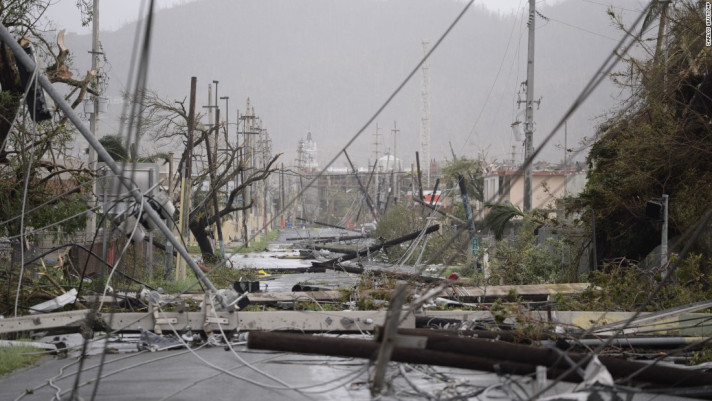Last week, the Puerto Rico Electric Power Authority awarded a small firm in Montana a $300 million contract to restore power to hurricane-ravaged Puerto Rico. Whitefish Energy Holdings, LLC, is a tiny start-up that has been in business for only two years. Public records show the company incorporated in Montana in 2015 and reports annual revenue of less than $200,000 with two-employees.
While recovery efforts in Puerto Rico have been glacially slow over the past five weeks since Hurricane Maria devastated the island, Whitefish seems to have been fast-tracked through the bidding and award process. Congressional leaders on both sides of the aisle are questioning how the small firm landed such a lucrative contract — in so little time and with so little resources. Their concerns are well founded.
In 2007, two Miami men with little to no experience in fulfilling government contracts were awarded a $300 million contract to provide arms to the United States military. As part of the nation’s ongoing efforts to supply forces in Iraq, the Pentagon opened thousands of contracts for bidding without scrutiny as to who was bidding or how they secured weapons and arms.
Often described as young “potheads,” Ephraim Diveroli and David Packouz were in their early twenties when they scored a miracle contract to outfit the Afghanistan military with millions of rounds of AK-47 ammunition. The two men sourced illegal Cold War era munitions in violation of federal laws to deliver the $300 million order.
The multi-million dollar fiasco led to a criminal investigation, millions of dollars in losses, and felony convictions for both men. After the dust settled, the Pentagon began asking the tough questions about its business practices on a website known as FedBizOps — fbo.gov — and how military contracts were awarded and fulfilled. In the wake of the busted contract, the Pentagon acknowledged how the SNAFU led to critical ammunition shortages on the ground and billions in wasted government money.
The story of the young gunrunners led to a National Magazine Award nomination for Rolling Stone Magazine’s exposé on the debacle and a best-seller for investigative writer Guy Lawson. A 2016 film, War Dogs, featured the tragic rise and fall story of Diveroli and Packouz. The aftermath of their inexperience and greed affected U.S., Afghan, and Iraqi troops for years.
With millions of lives on the line in Puerto Rico, it seems the sudden award of such an important task to a firm with minimal resources may lead to an unfortunate War Dogs sequel. Whitefish Energy, based — coincidentally, of course — in the hometown of Donald Trump’s Interior Secretary Ryan Zinke, faces a monumental task. Maria destroyed over 80% of Puerto Rico’s 2,500 miles of transmission lines and 32,000 miles of shorter delivery lines to homes and businesses across the island.
 The Whitefish contract is a tangled mess, just like Puerto Rico’s power grid.
The Whitefish contract is a tangled mess, just like Puerto Rico’s power grid.
With estimates to rebuild the island’s infrastructure reaching $4 billion, many are questioning Whitefish Energy’s ability to meet the high demand with such a limited staff and short-term experience. Prior to the contract with PREPA, Whitefish’s largest government contract had been a $1.3 million job to replace just four miles of line in Arizona. The company has eleven months to complete the project. If work in Puerto Rico moves at a similar pace, Whitefish will be on the island for the next 200 years.
San Juan Mayor Carmen Yulin Cruz has criticized the contract, calling for increased transparency in the process, which was not open to bids. Responding to Cruz, Whitefish Energy threatened to remove any workers from the island — adding to questions about the company’s integrity to oversee a highly critical project. Several larger companies, like Florida Power and Light, which has a mutual aid agreement with PREPA, mobilized utility workers to assess damage from Maria. However, FPL reported that the company never received replies from Puerto Rico authorities. According to the America Public Power Association, no other companies received responses to offers of aid. Apparently, the only company invited to negotiate with PREPA on rebuilding efforts was the unknown Whitefish Energy.
NBC Montana reported that one Whitefish employee had asked Secretary Zinke for assistance getting personnel to the island — allegedly after the contract was awarded — but Zinke had played no role in the contract process itself. Congressional leaders are not so sure about those claims with some members calling for inquiries by the Government Accountability Office.
As Puerto Rico’s people continue searching for drinking water and food, two Whitefish, Montana men are profiting from their suffering. They may not be War Dogs, but Whitefish Energy could be the next scandal to feed Hollywood. If Power Dogs does become a movie, look for its release in 2020 — everywhere except Puerto Rico, where they will still be lighting the night with candles and flashlights.
Share this:





